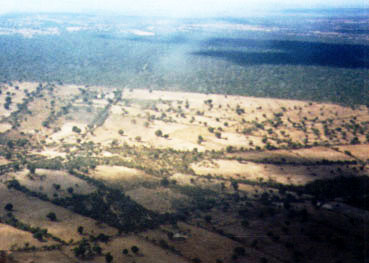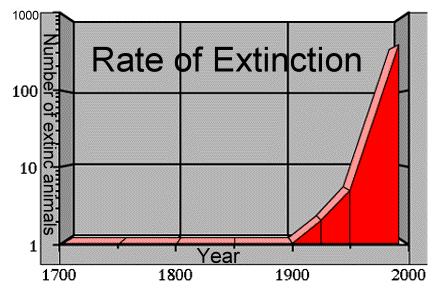"...but the loss of species and habitat goes on. The Cold War has ended but warfare continues, proving old diagnoses wrong and old remedies ineffective. Even as economic disparity is increasing, competition is urged with fundamentalist fervor as the single solution to all problems. Ecological health continues to elude us and perhaps indeed depends upon the reconstruction of patterns of thought. "
Commonizing costs and privatizing profit:
The rationality of unrestrained free enterprise in a mixed economy of the corporate state leads to irrational consequences when viewed from biological perspectives.


"single system of environment combined with high human civilization (is one) in which the flexibility of the civilization shall match that of the environment to create an ongoing complex system, open-ended for slow change of even basic ...characteristics."
Gregory Bateson, Steps to and Ecology of Mind, p. 494.
1 Commonizing the costs of enterprise
The goal of any private enterprise is to move its cost of business to the community and to commodify resources used by the public.
Government energy subsidies.
Air – smoke from exhaust is the most widespread degradation of a common resource we breathe.
Water – bottling water to sell from a common source is one example, but so is dumping waste into rivers.
Thus the mounting public expense is one outcome of acculmulated wealth by private interests.
Thus there are polluted streams, contaminated air, thermal pollution of water and air, loss of open lands, and wasteful logging practices or cattle grazing on federal lands at below costs besides mineral leasing for extraction on public lands.
Hardin, pp. 104-114.

Biotic Communities respond very differently to the disturbance, damage or destruction of habitats in which they thrive.
Impacts of human intrusions on habitats

-
Disturbance, an area is capable of recovery with time: based on the number of keystone species remaining.
-
Damage, the time for recovery is longer than the life of any of the longest lived keystone species.
-
Destruction, the area must be restored through adaptive management and active intervention.
Two opposing views to account for the way something is described based on its behavior:
Genotype and Phenotype;
The hard inheritance versus expressed inherited traits.
Biotic communities have reproductive potential based on populations’ capacity to vary, recombine and successfully raise offspring with some of the variability inherent in the ancestral species.
Culture or the means of passing on acquired traits or learned behavior: soft inheritance.
The first easily accessible of Bateson's books, Mind and Nature: A Necessary Unity, (1979) is the most readable of Gregory's books. Because it was not written for a particular professional community, it avoids arcane references and unfamiliar vocabulary and contains a glossary of Gregory's distinctive usages. Bateson argued that the ecology of mind is an ecology of pattern, information, and ideas that happen to be embodied in things -- material forms. A science which limits itself to counting and weighing these embodiments is likely to arrive at a very distorted understanding. Gregory had begun to characterize what he meant by a mind (or mental system) in "Pathologies of Epistemology" (p.482), where it was already clear that a mental system was for Gregory one with a capacity to process and respond to information in self corrective ways, a characteristic of living systems from cells to forests to civilizations. Now he developed that characterization into a list of defining criteria for mind. It becomes clear that a mind is composed of multiple material parts the arrangements of which allow for process and pattern. Mind is thus not separable from its material base and traditional dualisms separating mind from body or mind from matter are erroneous. A mind can include nonliving elements as well as multiple organisms, may function for brief as well as extended periods, is not necessarily defined by a boundary such as an envelope of skin, and consciousness, if present at all, is always only partial. This emphasis on mental systems as including more than single organisms leads Gregory to the insistence that the unit of survival is always organism and environment.
Having described mental systems, Gregory is able to lay out a number of other characteristics. He elaborates the notion that, in the world of mental process, difference is the analog of cause ("difference that makes a difference") and argues that embedded and interacting systems have a capacity to select pattern from random elements, as happens in evolution and in learning which Gregory calls the "two great stochastic processes." He explores the way analogy underlies all "patterns which connect," and develops a typology of habitual errors in ways of thinking, some minor, some potentially lethal.
The final paper in his volume Steps to an ecology of Mind is, "Ecology and Flexibility in Urban Civilization," (p.494) begins with the assertion that a healthy "single system of environment combined with high human civilization (is one) in which the flexibility of the civilization shall match that of the environment to create an ongoing complex system, open-ended for slow change of even basic ...characteristics (p.494)."
Ironically, this was a position paper written for a conference for planners in the office of John Lindsay, then mayor of New York City, a context in which extreme constraint combined with runaway change and the distinctive blindness and inflexibility of the political process. As he emphasized again and again, the process of systemic adjustment would require self observation and self knowledge.
Biotic communities |
Culture |
|
Artificial selection |
|
|
Site of evolution |
Financial marketplace |
|
Source of ecological services |
Domesticated crops |
|
Accumulating natural capital |
Commonwealth |
|
influenced by genetics
|
influenced by language |
Hardin, Filters Against Folly:
Hardin is rough on businessmen and bankers who like to commonize costs while privatizing profits (which is another way of saying that they're being subsidized).
Hardin's judgment: ''Typically, they say they are defending and conserving private enterprise. A medieval highwayman could have claimed as much.'' In arguing against policies that he identifies with commonization, Hardin keeps telling us that needs do not create rights. His examples repeatedly remind us of follies related to subsidies and bailouts, and they will % generally cause libertarian thinkers to feel a warm glow of agreement.
Hardin argues that the most dramatic accomplishments of modern medicine -- liver and heart transplants, for example -- are happening because the costs have been commonized. Taxpayers are bearing the burden for care of the aged and those with kidney diseases; in other cases, insurance companies have in effect commonized the costs among their policyholders.
However, Hardin doesn't want to privatize the commons in these cases. Instead he favors some quite biologically dictated limit on the age of the patients and the kinds of defects that would be eligible to receive such heroic treatments. This implies that he would actually consider barring older people from some kinds of coverage, even if an insurance company offered it. While criticizing what he sarcastically calls the ''medical commons.''
2 Darwinism and Neo-Darwinism: "Weissman Heredity"
The question here is what sort of characteristics can be inherited by organisms once their surroundings have been polluted by culturally acceptable behavior or widely expressed social norms (stated above). Do bacteria & fungi respond differently from plants and animals to disturbance, damage or destruction of habitats?
Mayr, pp. 90-131.
Weismann established seven supporting arguments to sustain natural selection as operating on the genotype in clearly material and particular ways to alter subsequent populations.
He refuted soft inheritance in terms of hard (material alteration of the genotype) inheritance:
- Populations must adapt to physical conditions (biota and habitat)
- As conditions change there is selective pressure on surviving members. (ecosystem)
Hardin raises the question in the CC PP Game (where societies institutions seek to commonize costs (externalities and subsidies) and privatize profits (what is accounted for and shared with investors) of whether or not culture (acquired traits or soft inheritance) is used to compensate for the actions of natural selection and if so, to what extent can this interference in biology be justified by culture?
- biology includes heredity how the genotype is expressed in the phenotype and its subsequent spread through a population. (Hard inheritance) "X" chromosome
- culture includes those traits acquired and passed
on by sensory impressions, learning, practice and experimentation. (Soft
inheritance)
Ethnicity, language, diet, habits.
This button below works as a navigational aid.
Last Updated on 9/15/2004, July 2, 2013 .
site-map | Ecology | laws | quick look
Science Index | Site Analysis | Population Index | Global Warming Index | Nature Index | Research sites.
Terms | Glossary | Word webs | Basic vocabulary | Advanced Vocabulary | Antonyms | Synonyms
Writing guide | Writing | Interviews | Free Writing

